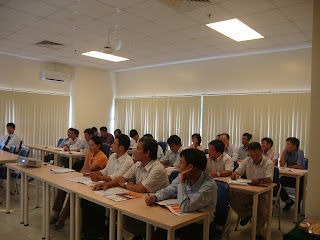CONTRACTOR’S
PRACTICE FOR MANAGING SUBCONTRACTOR: A CASE STUDY OF THE EVER RICH II PROJECT
IN HO CHI MINH CITY
By
Vo
Khac Kien
Abstract
In the recent
years, in most construction projects, particularly building projects prefer to
hire subcontractors. Consequently main contractor need to develop management
system standard in order to manage subcontractor rather than they will
undertake construction work by themselves. As a result, main contractor
concentrate on management strategies in term of tender process, type of
contract, schedule control, quality control, progress and payment, and subcontractor
safety.
In order to
understand how main contractor’s strategies manage their subcontractors, this
report was conducted through contractor documentation. The result shows
subcontractor control strategy in a local contractor. Major improvements are needed
for the subcontractor control strategy in local contractor in order to improve
the subcontractor management performance. However, there are some major points,
which need to be improved in order to strengthen and continually improve the
strategy performance.
Executive summary
Rationale
of research
This research has been conducted to identify Main Contractor’s
strategy for managing sub-contractors
within a project.
Objectives
of study
To
study management practices of contractors in contractor’s for managing
subcontractor in The Ever Rich II Project, Dao Tri Street, District 7, HCMC. Find
out strengths & weakness to propose recommendations.
Methodology
The
exploratory research method is used to study management practices in Vietnam.
Findings
and conclusion
In recent years, main contractor
have been trending to use subcontractor in specific area accordingly like as
specialist subcontractor, skilled-labor subcontractor and expertise provided by
subcontractor. Especially building project, it is common for 80 percent to 90
percent of the work to be performed by subcontractors.
However, there are many subcontractors
who do not have not enough expertise or skilled resources to undertake work
satisfactorily and, as a result, they are not able to bring good services to
clients or not reach their requirements. In order to resolve these problems
that main contractor needs to develop a strategy that allows contractor to
manage subcontractor effectively and efficiently.
According to the rationale stated
above, this study to conduct an investigation of main contractor’s strategy for
managing the subcontractor on construction project in terms of tender, unit
price contract, schedule control, quality control, progress and payment, and
safety.
Criteria Contractor’s
Strategy
Tender
o Experience is the
most important factor for subcontractor tendering.
o Capability
including financial, resource and material.
o Have a tender
process and focus on long-term relationship subcontractor.
o Time, quality of
performance, and price competitive are the project success measurement.
o Safety performance
plays important role in this project.
Contract
o Apply unit price
contract in order to save heavy cost of preparing many bills of quantity by the
subcontractor.
o Fair basis for
competition between subcontractors
o Changes in contract
documents can be made easily by the contractor compare to lump sum contract.
o Lower risk for
subcontractor compare to lump sum contract.
Scheduling
o CPM and Microsoft
Project was adopted as a toll for monitoring subcontractor’s schedule
o Using fast track
schedule in order to save the time.
o Weekly meeting and
monthly meeting in order to discuss the progress of subcontractor’s work
performance.
o Penalty for
subcontractor delay works.
o No bonus or incentive
for subcontractor early finish work.
Quality
o Developing quality
checklist to inspect subcontractor’s performance of each work.
o Materials enter in
and out site would be inspect and check using material record form.
o Weekly meeting
o Need worker
qualification standard for special works
o Requesting
subcontractor correct unacceptable works by a warming letter.
o Progress and
Payment
o Because of use unit
price contract so monthly progress payment based on actual quantity that
subcontractor done.
o Monthly progress
payment would be keep 5 percent retention that be paid on final progress
payment.
Safety
o Apply Environment,
Health and Safety requirements.
o Standard safety
policy.
o Providing PPE is a
obligatory condition during work at site.
o Conducting Job
safety analysis.
o Daily site safety
inspection by safety engineer
o Weekly meeting
would discuss safety issue and analysis site safety inspection report.
o Arrange safety
budget for safety program implementation.
Recommendations
·
Need
to develop standard for tendering for specialized sub-contractor.
·
Main
contractor should arrange international formally contract in order to manage
subcontractor in terms of legal procedure.
·
Main
contractor should use IT to monitor progress.
·
Main
contractor should develop quality management process to control all of
subcontractor performance.
·
Main
contractor should record subcontractor database to be able to know
subcontractor information. It helps main contractor to have better
understanding subcontractor’s performance.
·
Main
contractor should develop safety management system in order to analysis hazard
and minimize risk in subcontractor performance. Subcontractors have to obey contractor’s
safety policy and follow contractor’s safety program.
·
Main
contractor should develop long-term relationship with subcontractors.






